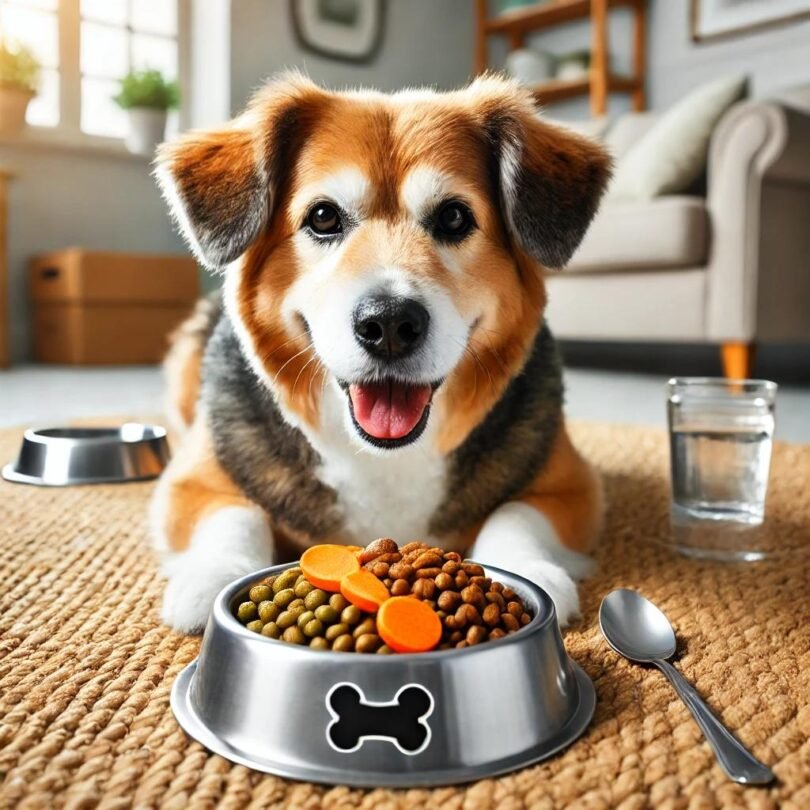Introduction
Kidney disease in dogs can be managed through proper nutrition, helping to slow disease progression and improve quality of life. Since the kidneys filter waste from the blood, a low-protein, low-phosphorus, and high-moisture diet can help reduce strain on these vital organs.
In this guide, we’ll explore the best foods for dogs with kidney disease, dietary adjustments, and feeding tips to support their health.
1. Key Nutritional Needs for Dogs With Kidney Disease
When adjusting your dog’s diet for kidney disease, focus on these essential nutrients:
✔ Low Protein (But High-Quality Protein) – Too much protein produces excess waste, putting stress on the kidneys.
✔ Low Phosphorus – High phosphorus levels can accelerate kidney damage.
✔ Increased Omega-3 Fatty Acids – Supports kidney function and reduces inflammation.
✔ High Moisture Content – Helps prevent dehydration, which is crucial for kidney health.
✔ Controlled Sodium Levels – Reduces blood pressure and kidney strain.
🐶 Avoid: High-protein meats, excess phosphorus (found in bones, dairy, and some fish), and salty foods.
2. Best Foods for Dogs With Kidney Disease
🔹 1. Vet-Prescribed Kidney Diet Dog Food
Many veterinary brands offer specially formulated kidney diets that meet the nutritional needs of dogs with renal disease.
✔ Recommended Brands:
- Hill’s Prescription Diet k/d
- Royal Canin Renal Support
- Blue Buffalo Kidney Support
These diets are low in protein and phosphorus but contain essential fatty acids and antioxidants to support kidney function.
🔹 2. Homemade Kidney-Friendly Dog Food
If you prefer homemade meals, work with your vet to create balanced kidney-supportive recipes.
✔ Homemade Recipe Example:
🥣 Ingredients:
- 1 cup cooked white rice (low phosphorus)
- ½ cup boiled sweet potatoes (rich in fiber & vitamins)
- ½ cup lean ground turkey or egg whites (low-protein, high-quality source)
- 1 teaspoon fish oil (for Omega-3s)
- ½ teaspoon calcium carbonate (to balance phosphorus)
🥘 How to Prepare:
1️⃣ Cook and mix all ingredients together.
2️⃣ Serve in small portions based on your dog’s weight and vet recommendations.
3️⃣ Store leftovers in the fridge for up to 3 days.
🔹 3. Safe Fruits & Vegetables for Dogs With Kidney Disease
Adding kidney-friendly fruits and veggies can provide extra fiber, antioxidants, and hydration.
✔ Good Options:
🥕 Carrots – Low in phosphorus & high in fiber
🍏 Apples – A great low-phosphorus snack (no seeds)
🥒 Cucumbers – Hydrating and easy to digest
🎃 Pumpkin – Helps with digestion and is low in protein
❌ Avoid: Grapes, raisins, onions, and garlic (toxic to dogs).
3. Foods to Avoid for Dogs With Kidney Disease
Certain foods can worsen kidney function and should be avoided:
🚫 High-Protein Meats – Beef, pork, chicken (unless in moderation)
🚫 Dairy Products – Cheese, milk, yogurt (high in phosphorus)
🚫 High-Sodium Foods – Processed treats, bacon, chips
🚫 Grains With High Phosphorus – Wheat bran, quinoa
🚫 Fish With High Phosphorus – Sardines, salmon skin
4. Feeding Tips for Dogs With Kidney Disease
✔ 1. Increase Water Intake – Always provide fresh, clean water to prevent dehydration.
✔ 2. Feed Small, Frequent Meals – Helps reduce strain on digestion and nutrient absorption.
✔ 3. Use Warm, Soft Foods – Kidney disease may reduce appetite, so warm meals enhance smell and taste.
✔ 4. Add Bone Broth – Hydrating and packed with beneficial nutrients (low-sodium only).
✔ 5. Monitor Weight & Adjust Portions – Kidney disease can cause weight loss, so ensure your dog gets enough calories.
5. Supplements for Kidney Health
Certain natural supplements can support kidney function:
✔ Omega-3 Fatty Acids – Found in fish oil, helps reduce kidney inflammation.
✔ B-Vitamins – Helps prevent deficiencies from frequent urination.
✔ Probiotics (Azodyl) – Supports gut health and reduces toxin buildup.
✔ Calcium Supplements – Helps balance phosphorus levels in the body.
🔹 Always consult your vet before adding supplements to your dog’s diet.
Final Thoughts
Managing kidney disease in dogs requires the right diet, hydration, and care. Whether you choose vet-recommended food, homemade meals, or kidney-friendly snacks, the goal is to reduce kidney strain and improve your dog’s quality of life.
🐶 Has your dog been diagnosed with kidney disease? Share your experiences and diet tips in the comments!








